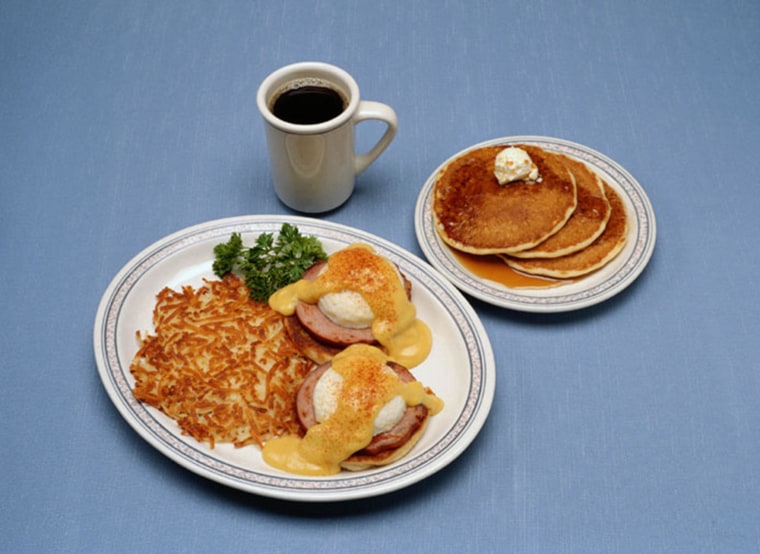Wake up and smell the price increase.
The all-American breakfast -- eggs, bacon and a cup of Joe -- is getting more expensive.
Commodity prices on bacon, coffee, milk and other breakfast staples are rising, and analysts say there’s no hitting the snooze button on this trend.
The reasons behind the increases vary — drought, disease, emerging market demand — as do the amounts by which volatility in wholesale costs will trickle down to consumers in grocery stores.
A few months ago, bacon prices were expected to drop after a year of increases. But an often-lethal disease, porcine epidemic diarrhea, has taken a significant toll on the number of pigs American farmers will be able to bring to market this summer, said Steve Meyer, president of Paragon Economics.
“It’s having a significant impact,” he said, estimating that supply could fall by 10 to 14 percent, making the retail price of pork and bacon as much as 15 percent higher.
“We haven’t seen these kinds of cutbacks in decades,” said Altin Kalo, an economist at Steiner Consulting Group who also predicted a 10 to 15 percent drop in pork production. “That’s expected to be inflationary for bacon prices,” he said.
At an average of $5.49 a pound, bacon was already pricey, Meyer pointed out. The price has been climbing steadily for a number of years; Kalo said retail bacon prices in the last year were 31 percent higher than they were in 2009.
This means retailers will be limited in how much further than they can push bacon prices. Percentage-wise, the increase won’t be as high as for other pork products, such as breakfast link sausages, but that’s not likely to be much consolation to shoppers now forking over more for breakfast bacon.
“You tack 10 percent on that and you’re bumping to $6 a pound on average,” Meyer said.
And if you're achin' for those eggs that go with bacon...there's good and bad news. According to the Department of Agriculture, egg prices fell 1.1 percent in January, but they are 6.1 percent above last year’s level. Egg prices are highly seasonal and are among the most volatile to forecast, the USDA said.
Aside from bacon and eggs, breakfast beverages will take a bigger gulp out of consumers’ wallets. Prices of coffee, orange juice and milk all are on the upswing.
Coffee is the biggest casualty, the result of an unexpected drought in Brazil that struck during the height of the growing season.
“That dollar cup of coffee? You’re not going to be able to find that anymore,” said commodity trading consultant Mike Seery. Coffee futures have recently climbed 100 percent from where they were earlier in the growing season, he said.
“You’re going to see a 50 to 70 percent increase … If you were paying $13 [a pound], expect $18 now,” he said. Seery said coffee prices have already been increasing, while the sticker shock is exacerbated by the fact that coffee prices had been in a trough before.
“Brazil was expected to have a record crop… suddenly it was like the spigot got shut off,” said Judith Ganes-Chase, founder and president of J. Ganes Consulting.
Brazil is far and away the world’s biggest coffee producer. To make things worse, second-largest producer Vietnam is also experiencing drought, Ganes-Chase said.
She doesn’t predict as large a jump in retail prices, saying that roasters are likely to absorb some of the cost. But it’s unclear for how long they’ll be able to do so, though. A complicating factor is that the lack of rain is hurting the coffee bushes as well as the fruit, which means the drought’s harmful effects might not be limited to just this year’s harvest. “This time, it’s a two year problem,” Ganes-Chase said.
Switching from coffee to OJ might not give people as much relief as they would like, either. Although Americans are drinking less orange juice than they used to, analysts say supplies are getting a double-whammy this year: Brazil, which produces about half the world’s supply, has that drought to contend with, while a plant disease has been afflicting citrus growers in the U.S. The upshot, said Seery, could be a 10 to 15 percent increase in the retail price of orange juice.
Milk prices also are expected to increase this year, experts say. The culprit this time isn’t weather or sickness, but steadily increasing demand from emerging markets, especially China, along with tight supply.
Marin Bozic, assistant professor and associate director of the Midwest Dairy Foods Research Center at the University of Minnesota-Twin Cities, predicted that the price of milk, which was $3.55 in January, could climb another 40 cents by May.
“Not only are U.S. dairy exports strong, but domestic supply of milk is also growing at a very slow pace,” Bozic said via email. “As a result, U.S. prices for dairy foods are currently near historical highs.”
Even if you don't eat a cooked breakfast, you won't avoid price increases. The U.N. Food and Agriculture Organization's cereal price index for February rose 3.6 percent, reflecting concerns over the effects of freezing temperatures on wheat crops in the Midwest.
The FAO also reported a jump in price for sugar and palm oil -- both key ingredients in boxed cereals.
However, the FAO also raised its world cereal stocks forecast for the 2014 season, predicting it will be the second largest crop ever, which should help stabilize prices.
What if you don't eat eggs and bacon or cereal? Well, even the humble banana could cost more soon.
On Monday, Chiquita Brands International announced it agreed to acquire Irish produce company Fyffes, a deal that would create the biggest banana company in the world.
“It’s fair to assume banana prices will move higher in years to come,” said Brett Hundley, an analyst at BB&T Capital Markets.
